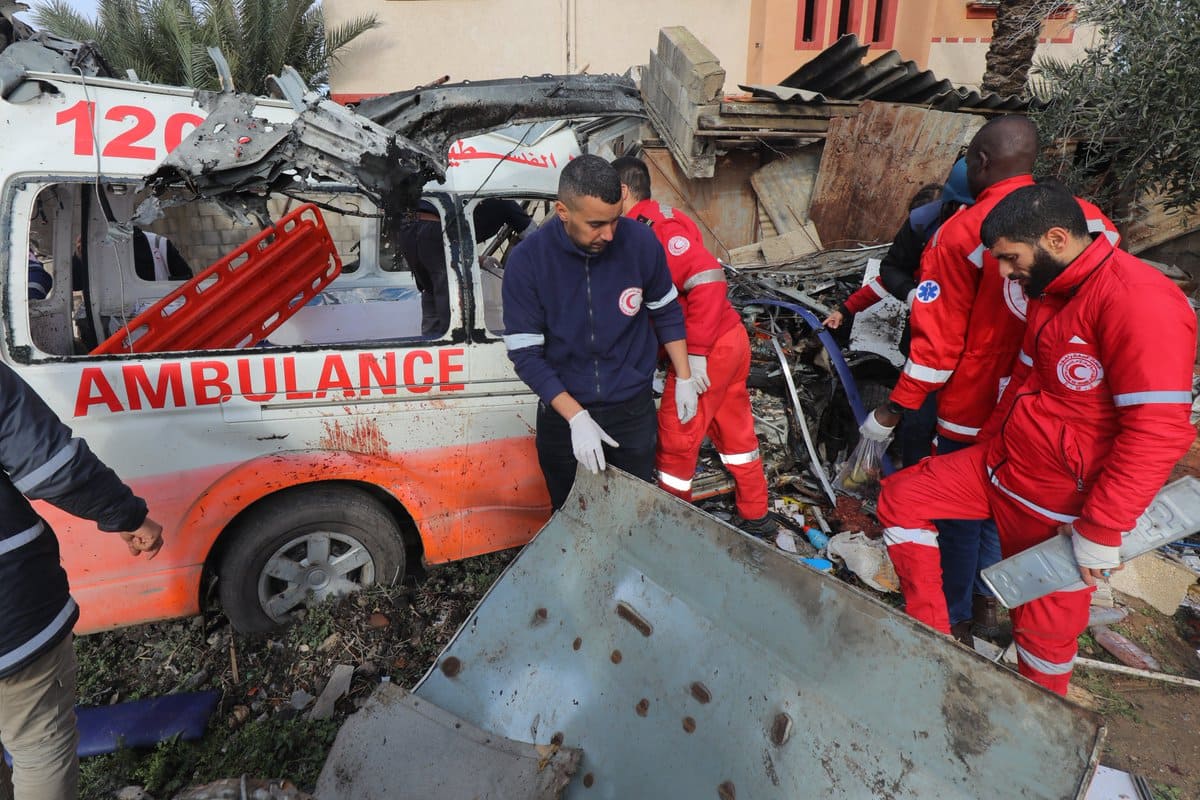Since the outbreak of war on Gaza on 7 October 2023, the healthcare system has faced relentless attacks. According to the World Health Organization (WHO), over 1,043 health facilities across Gaza, the West Bank, and East Jerusalem have been targeted and hit, leaving many inoperable.
The toll on healthcare workers has been staggering, with more than 885 medical personnel—including nurses, paramedics, and doctors—killed, and countless others injured.
These repeated assaults on the healthcare system highlight a growing tactic in modern conflicts: the weaponization of healthcare, where medical services and personnel are deliberately targeted to deepen humanitarian crises.
In particular, the weaponization of healthcare refers to the deliberate targeting of medical professionals, facilities, and systems during armed conflicts. This practice is considered a violation of international humanitarian laws, such as the Geneva Conventions, which mandate the protection of healthcare workers and facilities as neutral entities in war zones.
Specifically, Article 18 of the Fourth Geneva Convention ensures the protection of hospitals and their personnel, while Additional Protocol I prohibits attacks on medical units, transports, and individuals designated for medical purposes.
Violating these principles undermines the provision of essential medical care; it also exacerbates the suffering of civilian populations and disrupts the broader healthcare system.
Despite these protections, such violations persist.
Among those lost was Dr. Adnan Al-Bursh, a renowned orthopedic surgeon in Gaza, on 19 April 2024. According to video footage released by Sky News, which included testimonies from fellow detainees on his final moments, Dr. Al-Bursh endured severe hardships before his death.
Dr. Adnan Al-Bursh, renowned for his skill and dedication, served as the head of orthopedic medicine, and was a leading surgeon, at Al-Shifa Medical Complex.
Widely regarded as one of Gaza’s most experienced and highly trained doctors, he was also a professor of orthopedic medicine, with a master’s degree in political science.
With the hospital overwhelmed and resources exhausted, he cared for patients around the clock, even digging mass graves alongside colleagues.
Forced to relocate as Israeli forces approached Al-Shifa, Dr. Al-Bursh continued his work at other facilities despite the worsening conditions. In December 2023, he was detained by Israeli forces under unclear circumstances.
Testimonies from fellow detainees allege severe physical abuse during his detention, leaving him unable to walk unaided. On 19 April 2024, shortly after being transferred to Ofer Prison, Dr. Al-Bursh died as a result of the extreme torture he endured during his captivity.
Dr. Al-Bursh’s death underscores the weaponization of healthcare in Gaza, where medical facilities and workers have become casualties in the ongoing conflict even in contexts where their neutrality is formally recognized.
Amidst already overwhelming humanitarian challenges, such attacks exacerbate the crisis and severely undermine the healthcare system’s ability to function.
On 29 January 2024, two Palestine Red Crescent Society paramedics, Yusuf Zeino and Ahmed al-Madhoun, were killed while attempting to rescue six-year-old Hind Rajab, who had been trapped in a car with her deceased family for hours.
After obtaining clearance from the Israeli military to approach and assist, the paramedics were targeted.
Their remains, along with a destroyed ambulance that appeared to have been crushed by a tank, were discovered 12 days later.
Since early October 2023, healthcare facilities in Gaza have been repeatedly targeted or disrupted by Israeli airstrikes and incursions. Hospitals like al-Awda, Al-Quds, and Abu Yousef al-Najjar were forced to evacuate, with many suffering heavy damage.
The Al-Ahli hospital blast on 17 October 2023, which caused over 800 casualties, drew widespread condemnation, though responsibility remains disputed. Israeli forces also targeted facilities like the Al-Shifa Medical Complex, accusing Hamas of militarizing hospitals despite limited evidence.
These attacks, alongside fuel shortages and supply blockades, severely constrained Gaza’s healthcare system, forcing doctors to perform surgeries without anesthesia and leading to preventable deaths.
The blockade further aggravated health vulnerabilities by limiting access to water, sanitation, and food, pushing Gaza to the brink of epidemics.
Overcrowding and inadequate facilities heightened the risks of waterborne diseases like cholera and hepatitis. Additionally, the use of white phosphorus caused severe injuries and environmental damage, threatening long-term health and food security in the region.
The deliberate targeting of Gaza’s healthcare system reflects a profound disregard for humanitarian principles, leaving its population increasingly vulnerable to preventable suffering.
This systematic destruction highlights the urgent need for accountability and protection of medical neutrality in conflict zones.
The opinions and ideas expressed in this article are the author’s and do not necessarily reflect the views of Egyptian Streets’ editorial team.
To submit an opinion article, please email [email protected].




Comments (0)